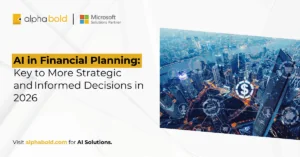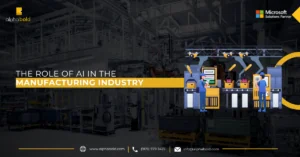Generative AI: Transforming Industries with Real-World Innovation
Table of Contents
Executive Summary
The generative AI industry is rapidly transforming how businesses operate, shifting from analyzing data to creating entirely new content, designs, and ideas. Unlike traditional AI, generative models produce original outputs based on learned patterns, opening new possibilities across sectors. From product development in manufacturing to fraud prevention in finance and content creation in marketing, these tools are reshaping operations and decision-making. Yet with opportunity comes complexity. Many organizations face challenges related to data quality, integration, and governance. This blog explores real-world applications, benefits such as increased efficiency and personalization, and how AlphaBOLD helps companies implement generative AI solutions that deliver measurable results.
What Is Generative AI and How Does It Work?
At its core, generative AI encompasses a family of algorithms and models capable of producing new content based on patterns learned from training data. Unlike discriminative models that categorize or predict based on input data, generative models learn the underlying structure of data to create entirely new outputs —making them a powerful asset for AI in Industry.
The recent surge in generative AI in industry capabilities has been driven by several key technological advancements:
- Large Language Models (LLMs): Tools like GPT-4 and Claude have revolutionized text generation, enabling everything from contextual conversation to complex content creation —supporting a wide range of real world AI applications across sectors.
- Diffusion Models: These have transformed image generation, creating highly detailed and realistic visuals from text descriptions.
- Multimodal AI: Systems that can process and generate content across multiple formats (text, image, audio, video) enable more comprehensive and intuitive interactions.
What makes today’s generative AI particularly powerful is its ability to understand context, follow nuanced instructions, and produce outputs that closely align with human intent. This represents a significant leap from earlier AI systems that operated within narrow, predefined parameters.
How Generative AI Is Transforming Key Industries
Healthcare:
In healthcare, generative AI is moving beyond basic administrative tasks to impact patient care and medical research directly:
- Drug Discovery: Pharmaceutical companies are using generative models to design novel molecular structures that could lead to more effective medications. This approach has sometimes shortened discovery timelines from years to months.
- Medical Imaging: AI systems can now generate synthetic medical images for training purposes, addressing privacy concerns while providing diverse training data for diagnostic algorithms.
- Personalized Treatment Plans: By analyzing patient data and medical literature, generative AI helps physicians develop customized treatment approaches that consider individual patient factors.
Manufacturing:
The manufacturing sector is leading in practical adoption of AI in manufacturing, leveraging generative models to optimize design, efficiency, and uptime:
- Generative Design: Engineers are using AI to explore thousands of design alternatives that meet specific parameters, resulting in components that are lighter, stronger, and more efficient than traditionally designed parts.
- Predictive Maintenance: AI models can now generate predictive insights about equipment failures before they occur, allowing for targeted maintenance that reduces downtime.
- Supply Chain Optimization: Generative models help manufacturers anticipate disruptions and automatically suggest alternative sourcing or production strategies.
Financial Services:
Financial institutions are leveraging generative AI in industry to enhance security, improve customer experiences, and identify new opportunities:
- Fraud Detection: Advanced generative models can simulate potential fraud scenarios, helping security systems recognize new threats before they become widespread.
- Personalized Financial Advice: AI systems can generate tailored financial recommendations based on individual circumstances, goals, and risk tolerance.
- Market Analysis: Generative AI helps analysts process vast amounts of market data to identify patterns and generate insights that might otherwise be missed.
Retail and E-commerce:
Retailers are using generative AI to reimagine customer experiences and streamline operations:
- Personalized Shopping Experiences: AI systems generate product recommendations based on individual preferences, browsing history, and current trends.
- Virtual Try-On: Generative models allow customers to visualize products in real-world contexts, reducing return rates and increasing purchase confidence.
- Inventory Management: AI helps retailers predict demand patterns and optimize inventory levels across multiple locations.
Content Creation:
Generative AI has revolutionized the content creation landscape:
- Marketing Copy: AI systems can generate tailored marketing content for different audience segments, increasing engagement and conversion rates.
- Visual Content: Generative models create custom images and videos for marketing campaigns, reducing production costs and timelines.
- Localization: AI helps businesses adapt content for different markets, considering cultural nuances and language differences.
Dominate Your Industry with Gen-AI
AlphaBold deploys generative AI in industry to transform workflows and customer experiences across sectors, delivering measurable competitive advantage. See AI tailored to your industry.
Request a ConsultationWhat Are the Challenges of Implementing Generative AI?
Despite its transformative potential, implementing generative AI comes with significant challenges:
- Data Quality and Bias: Generative models reflect the data they’re trained on, potentially perpetuating or amplifying existing biases if not carefully managed.
- Integration with Legacy Systems: Many organizations struggle to connect generative AI tools with their existing technology infrastructure.
- Governance and Control: Ensuring that AI-generated outputs align with brand guidelines, regulatory requirements, and ethical standards remains challenging.
- Skill Gaps: Many organizations lack the technical expertise to implement and manage generative AI systems effectively.
- Return on Investment: Quantifying the business value of generative AI implementations can be difficult, especially for novel applications.
How AlphaBOLD Helps Businesses Implement Generative AI
At AlphaBOLD, we’ve developed a comprehensive methodology for helping businesses implement generative AI solutions that deliver tangible results:
- Strategic Assessment: We begin by understanding your business challenges and identifying where generative AI can create the most value.
- Proof of Concept: We develop targeted pilots to demonstrate value and gain organizational buy-in before full-scale implementation.
- Custom Solution Development: Our team designs and implements tailored generative AI solutions that integrate seamlessly with your existing systems.
- Change Management: We help your team develop the skills and processes needed to leverage generative AI tools effectively.
- Continuous Improvement: We establish metrics and feedback loops to ensure your generative AI implementation evolves with your business needs.
This approach has helped our clients overcome common implementation challenges and realize the full potential of generative AI technologies.
Further Reading: Scaling Generative AI: 7 Truths Every CIO Needs to Know
FAQs: Considerations Around Generative AI in Industry
While not yet widely adopted, these tools are starting to support compliance by generating structured reports, simulating regulatory scenarios, and automating documentation workflows. These applications require strict validation and governance controls but show promise in regulated industries.
Traditional automation tools follow fixed rules or workflows, while generative AI creates new content or solutions based on learned data patterns. This makes such tools more adaptive and creative, but also more complex to control and validate.
Successful implementation requires a mix of data scientists, AI engineers, domain experts, and business strategists. Organizations also need strong data governance, change management support, and alignment between IT and business teams.
Security depends on implementation. Enterprises must ensure that generative AI models are deployed in secure environments, monitored for misuse, and audited for output accuracy. Third-party model usage also raises IP and data privacy concerns.
Start by defining clear metrics: time saved, output quality, accuracy, or revenue impact. ROI should also account for the cost of implementation, infrastructure, training, and ongoing optimization. AlphaBOLD recommends proof-of-concept pilots before scaling enterprise-wide.
Are You Making the Most of What Generative AI Has to Offer?
Get a custom consultation where we'll show you how to turn these powerful technologies into actionable solutions that drive growth.
Request a ConsultationConclusion
Generative AI represents a pivotal shift in how businesses can approach innovation, efficiency, and growth. While technology continues to evolve rapidly, organizations that begin implementing strategic generative AI solutions today stand to gain significant competitive advantages.
At AlphaBOLD, we’re committed to helping our clients navigate this complex landscape, implementing practical generative AI solutions that deliver measurable business value. Whether you’re looking to enhance customer experiences, streamline operations, or develop entirely new products and services, generative AI in industry offers unprecedented possibilities.









